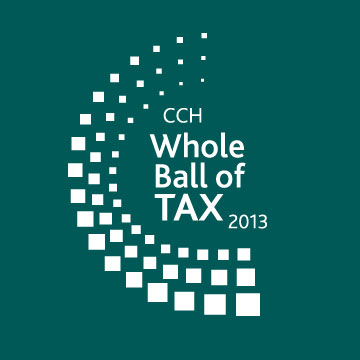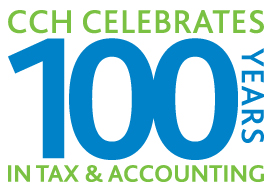| Home | About Us | Order Products | Press Center | Customer Service | Career Opportunities |

CCH can assist you with stories, including interviews with CCH subject experts.
Also, the 2013 Visit the CCH Whole Ball of Tax site often as new releases and other updates will be posted CCH provides special CCH Tax Briefings on key topics at CCHGroup.com/Legislation.
|
CCH Examines Tax Breaks, Caveats for People Out of Work(RIVERWOODS, ILL., January 2013) – While the unemployment rate continued to decline in 2012, about 12.2 million people were without work at year end. Now, with tax time approaching, there are special issues these taxpayers need to consider, according to CCH, a Wolters Kluwer business and a leading global provider of tax, accounting and audit information, software and services (CCHGroup.com). “Being unemployed can have a significant impact on your tax situation, not only in terms of credits and deductions you may be eligible for, but also additional income taxes and possibly penalties someone may be confronted with for withdrawals from retirement accounts or work done as a freelancer,” said CCH Principal Federal Tax Analyst Mark Luscombe, JD, LLM, CPA. Below, CCH answers tax-related questions for people who were out of work last year. Are unemployment benefits taxed? Yes, unemployment benefits are considered taxable income, as is any severance package or income earned prior to being unemployed. Additionally, just like employees, people who are unemployed are expected to have both state and federal taxes withheld from their unemployment benefit checks. States inform individuals of this option and do the withholding, but if someone opts out, they are then required to file quarterly estimated federal and state taxes. If they don’t, they may be subject to a late payment penalty in addition to owing the outstanding taxes. “While it may seem like it’s knocking someone when they’re down to tax their unemployment benefits, most people who are unemployed for a long time will likely be in a much lower tax bracket than they were when employed, so taxes paid may be returned to them in the form of refunds or credits,” said Luscombe. For those out of work, the average duration of unemployment in the United States is approximately 38 weeks, according to the U.S. Department of Labor. Are there credits or deductions that people who’ve been unemployed may be eligible for? There are not specific credits and deductions for the unemployed. However, because of their situation, many people who are out of work may be eligible for tax breaks they haven’t typically taken in the past. These can include:
What are the tax implications of tapping retirement savings? It’s not uncommon for people who are unemployed to tap their IRA or 401(k) savings. However, amounts withdrawn from retirement savings prior to age 59½ are generally taxable as income – and can trigger a 10-percent penalty. “With some planning, there are steps people can take to avoid the penalties, but even so, withdrawing from retirement savings should be a last resort as it generally can’t be repaid and, therefore, represents a significant opportunity loss for building tax-favored income for retirement,” said Luscombe. For traditional IRAs, individuals have up to 60 days to repay money withdrawn before being taxed or penalized for the withdrawal. There are a few exceptions to the penalties if the money is used for specific purposes, including health insurance if you are unemployed. In such instances, you would not face a penalty, but would have to pay tax on the amount withdrawn. You may be able to avoid an early withdrawal penalty by establishing a payment schedule of regular equal withdrawals over your lifetime or the joint lives of you and your beneficiary until you reach age 59½. Roth IRAs do not impose a penalty on withdrawals – as long as the amount withdrawn does not exceed the amount contributed; any investment earnings that are withdrawn may be subject to penalty. For 401(k)s, both loans and hardship distributions may be allowed, depending on the plan. However, loans from 401(k)s can only be taken if you are employed by the company. An employee who takes a loan and then loses or leaves their job is required to immediately repay the loan – otherwise, it’s considered a withdrawal, subject to tax and penalties. Hardship withdrawals from 401(k)s may also be permitted for specific reasons, such as to avoid eminent eviction or foreclosure, unreimbursed medical expenses or expenses for repairing damage to your home. However, even distributions for these purposes will trigger a 10-percent early withdrawal penalty if you are under 59½ unless you meet one of just a few exceptions, including if you lost your job in the year you turned 55 or older. Individuals under 55 who need to tap their 401(k) while unemployed may want to consider rolling it over to a Rollover IRA and then taking penalty-free distributions from the Rollover IRA using a payment schedule of regular equal withdrawals as described for traditional IRAs. Are there tax breaks for picking up freelance work? For those who decide to give freelance work a try, there are both tax consequences and potential benefits. The self-employed are required to pay both employee and employer Medicare and Social Security taxes if they made more than $400 in income from freelancing. For 2012, both employees and the self-employed received a tax break on the amount of Social Security tax they had to pay under the Middle Class Tax Relief and Job Creation Act of 2012. The Social Security tax was 10.4 percent on self-employment earnings up to $110,100, in addition to the 2.9 percent for Medicare tax on all self-employment earnings. The Social Security tax break is not available for 2013. Therefore, the tax for the self-employed is 12.4 percent on income up $113,700 for 2013. On the flipside, as a freelancer you can deduct 100 percent of health insurance premiums; home office expenses; dues for unions or professional associations; advertising and marketing; gifts valued up to $25 to business associates; business-related legal and professional services; and business travel expenses. Additionally, you can take depreciation on office equipment and may be eligible for certain small business credits. About CCH, a Wolters Kluwer businessCCH, a Wolters Kluwer business (CCHGroup.com) is a leading global provider of tax, accounting and audit information, software and services. Celebrating its 100th anniversary in 2013, CCH has served tax, accounting and business professionals since 1913. Among its market-leading solutions are the ProSystem fx® Suite, CCH Integrator™, CCH® IntelliConnect®, Accounting Research Manager® and the U.S. Master Tax Guide®. CCH is based in Riverwoods, Ill. Follow us on Twitter @CCHMediaHelp. Wolters Kluwer (www.wolterskluwer.com) is a market-leading global information services company. Wolters Kluwer is headquartered in Alphen aan den Rijn, the Netherlands. Its shares are quoted on Euronext Amsterdam (WKL) and are included in the AEX and Euronext 100 indices. -- ### -- nb-13-34 |
© 2024, CCH INCORPORATED. All rights reserved. |
Back to Top | Print this Page | ||||||||||||||||||
